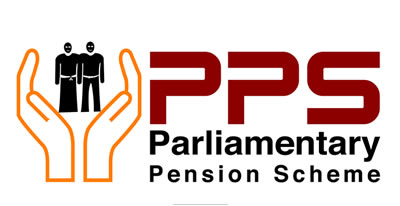Pensioner's Seminar, 21st June 2019
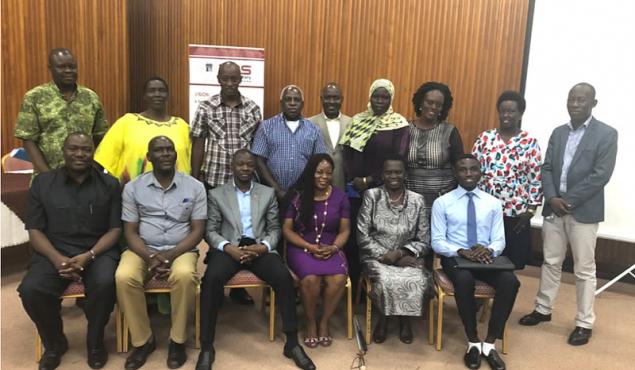
Executive Summary
The Board of Trustees developed an education programme to equip pensioners of the Scheme with skills and knowledge to deploy in retirement. The objective of the seminar was to enhance pensioner’s knowledge on Health and entrepreneurship. The one day session was organised for pensioners and took place at Imperial Royale Hotel on 21st June 2019. The topics included Retirement and Entrepreneurship, Nutrition & wellness and the Parliamentary Pension Scheme design.
The Chief Operations Manager, Parliamentary Pension Scheme, provided the opening remarks while the welcome remarks were provided Hon.Dr. Francis Epetait on behalf of the Chairperson, Board of Trustees.
The presenters emphasized that though retired, initiatives could still be explored with the little income available to come up with entrepreneurial opportunities to support a comfortable life. It was never too late to start something. Key among the recommendations was to engineer wellness by embracing healthy lifestyles. The frequently asked questions by members were also addressed.
1.0 Introduction
The Parliamentary Pension Scheme organised a one day seminar for its Pensioners which was held on 21st June 2019, at Imperial Royale Hotel in Kampala. The purpose of the session was to enhance members’ knowledge on effective planning in retirement for a comfortable life. Real life experiences in retirement were also shared during the event.
1.1 Methodology
The seminar took the form of formal presentations and interactive discussions. The topics presented were as follows:
• Retirement and Entrepreneurship
• Nutrition & Wellness
• My Parliamentary Pension Scheme (frequently asked questions).
1.2 Objectives
• Sensitize members on entrepreneurship opportunities during retirement;
• Appreciate real life opportunities and challenges and accept change;
• Improve health and well-being
• Addressing frequently asked questions on Scheme operations;
2.0 Proceedings of the activity
The seminar started at 9:30 am with an opening prayer led by Mr. Mustapha Ibona
2.1 Opening Remarks by the Chief Operations Manager
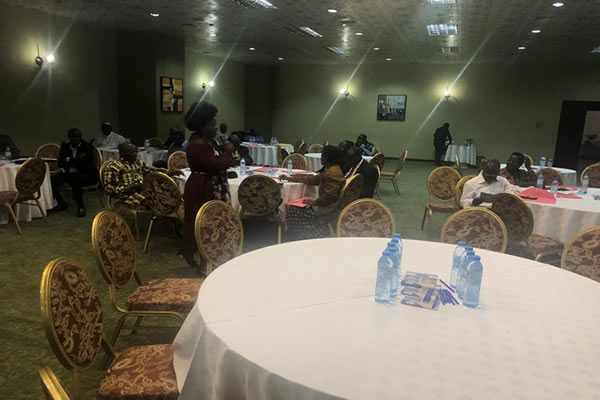
Ms. Nightingale Mirembe Ssenoga welcomed members and facilitators to the session and thanked them for honouring the invitation. She appreciated the blessing to have two members of the Board of Trustees in attendance and in this regard recognized the presence of Hon. Dr. Francis Epetait and Mr. Aloysius Makata. She was happy to note that the pensioners looked good which was an encouraging sign. She indicated that the purpose of the session was to ensure pensioners are able to innovate and thrive in retirement.
She noted that most members wished that the member education should have started much earlier. She explained that while in active service, people tend to give priority to other things and it was very unfortunate that such sessions were appreciated after retirement. She emphasized that at any one time, it was never too late to acquire knowledge. This was the second training organised for pensioners. The focus was on retirement, nutrition and wellness through presentations and panel discussions. She reported that the Scheme fund size was at Ugx. 230 billion (Two Hundred and Thirty Billion Shillings) and the number of pensioners stood at 109 while the beneficiaries were 9.
She requested members to always pay attention to matters of the Scheme since these personally affected them. She reported that efforts were still being pursued to enhance pension of those members who retired in 2011. In this regard, the Board had submitted a proposal to the Parliamentary Commission and their response was still awaited.
She wished members a successful session.
2.2 Welcome Remarks, Chairman Board of Trustees
Hon. Dr. Francis Epetait welcomed members to the second Pensioners session. He conveyed apologies from the Chairperson Board of Trustees who was not able to attend the session. He expressed gratitude to members for honoring the invitation.

He was optimistic that most of them got the invitation notice and was excited to see happy faces. He thanked the almighty God and families of the members for the supportive input towards their wellbeing. He noted the positive rate of growth of the fund highlighted by the Chief Operations Manager and thanked the Parliamentary Commission (sponsor) for the continued support. He hoped that with time the Scheme would be self-sustaining. He informed members that the Scheme currently had two Fund Managers, Gen Africa Asset Managers and Stanlib which were doing a good job. He commended the secretariat for the hard work, being good listeners and timely coordination of the Board to ensure growth of the Scheme. Pensioners were encouraged to relay feedback to the Board on how they are treated.
He underscored that in order to address the prevailing gaps, a number of policies had been implemented such as a five years Strategic Plan, Investment Policy Statement, Governance Manual, Finance Manual, Administration and Operations Manual, Human Resource Manual and the Benefits Administration Manual.
He informed members that the Board was still trying to take care of members who exited before 2001 (before the Act came into place). During a conference held at Serena Hotel, His Excellency the President of Uganda while recognizing the service of former Members of Parliament pledged to help this category by paying them a token for appreciation. He reminded members that the role of the Board of Trustees was to oversee the implementation of the Parliamentary Pension Scheme’s vision which takes care of former Members of Parliament and staff of the Parliamentary Commission since 2001. The promise by the President was not under the Parliamentary Pension Scheme law for those who served before 2001. The Board of Trustees had however engaged the services of Argen Actuarial Solutions to come up with scenarios for members of the 1st – 6th Parliament and the report was submitted to the Rt. Hon. Speaker for consideration.
He stressed that there were a number of challenges faced during retirement such as lack of medical insurance. After consultations with various stakeholders, it was clarified to the Board that members’ contributions could not be used to facilitate medical insurance for pensioners. The current arrangement was that active members were on health insurance cover provided by the Parliamentary Commission but those out of service were not catered for. Those in service could start making contributions to health insurance cover which will take care of them on exit. Unfortunately members who are already retired are left out. This therefore called for Pensioners to come up with a plan for medical insurance which could be incorporated with that of active members for easy management and cost effectiveness. Most insurance companies were reluctant to enroll pensioners since they are perceived a high liability associated with health complications in old age.
Incomplete member information was another challenge faced by the Scheme. Most files lacked complete information impacting on the smooth processing of benefits upon the demise of a member. All were cautioned to verify and avail missing information on their files to the Benefits Administration Manager. Going forward a member desk to update missing information will be improvised during the subsequent sessions. He conveyed apologies and greetings from Hon. John Arumadri who could not attend due to his busy involvement in organizing a family event which was scheduled for 29th June 2019. He introduced staff of the Scheme and thanked them for efficiently organizing the seminar.
He wished members fruitful deliberations and success in their retirement journey.
2.3 Highlights of the Presentations
2.3.1 Life After Retirement, Entrepreneurship Opportunities
The presentation was delivered by Ms. Helen Kirunda, an inspirational speaker from….. She requested members to draw a picture of who they were and reflect on whether they were happy or not. She reminded members that it was time to get out of the frame by accepting who they were and what they were capable of doing in life.
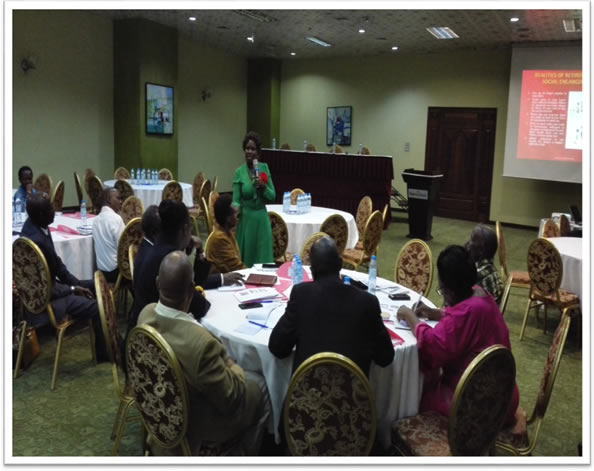
She alluded that today’s statistics from the National Social Security Fund (NSSF) indicated that 50 - 60% of pensioners had their money used up in the 1st three years due to lack of proper information and poor investment decisions. This member education is intended to protect the pension funds.
She emphasized that there are things worth knowing and steps to be considered before investing /spending retirement funds. Key among these was coming up with a retirement strategy in which people set realistic goals, accept trade -offs, learn and get advice, avoid big mistakes, make a long term plan and follow it. She explained that the stages of strategic planning included;
(i) Analysing the position, (ii) Prioritizing the criteria (iii) Defining goals (iv) Defining accountability and (v) Reviewing performance.
She guided members to start investing with the little they had and to explore approaches such as the cookie jar, engaging services of investment advisors, low initial investment mutual funds, playing it safe with treasury securities, shares, property and defensive investments.
She implored members to stick to their retirement goals, come up with monthly or annual budgets, find out about the employer’s pension plans, utilize investment plans, consider basic investment principles, avoid touching retirement savings until sufficient research had been done. Ask plenty of questions to ensure a continuous and comfortable retirement life. She warned that as people grow older, the children they worked hard for leave to raise their own families and pursue their own goals. It was therefore essential to build strong social ties with the family, people in places of worship, charity, social clubs and childhood friends.
It was noted that people had only 10 -15 years of active working life at the age of 50 years and above. It was very unfortunate that most of the people one assisted or took care of (including family members) tend to forget or abandon you. Priority should be to foster social support through respect and value for friendship, relationships and integrity bearing in mind that it was never too late to change.
Members were finally requested to meditate on the saying that “an old age without a penny in the pocket was a slow, agonizing death sentence”!
Members were advised to;
• Build retirement homes which will guarantee comfort in old age.
• Build businesses that would feed them in retirement.
• Create conveniences that will engage them in old age.
• Build friendship and good will that would serve them in old age.
• Avoid going to former places of work without invitation or notice of visit.
• Keep in touch with work or professional colleagues.
• Attend celebrations of old friends. Such reunions come with a lot of fun.
• Plan for the day and follow the plans.
• Avoid sitting and doing nothing to get rid of the feeling of emptiness.
• Travel and visit places of interest.
• Embrace 7 types of happiness in whatever they do which include: (gratitude, pride, love, contentment, excitement, and optimism).
• Eat right, enjoy the meals but avoid excessive consumption of alcohol, sugar, salt, fats and oils.
• Regularly go for medical check-up even when feeling healthy.
• Create a life that feels good on the inside not one that just looks good on the outside.
• Always be positive: At the end of the day all people were the same.
• Avoid copying things that other people were doing.
• Utilize their hobbies to make money.
• Guard against people who can create disorganisation in one’s life.
• Start now your commitment and relevancy in places of worship, family, childhood friends, voluntary clubs and community. Such support was pertinent as people grew older.
2.3.2 Experiential Presenter 1- Alex Ojambo, Nile Hotel Jinja
Mr. Alex Ojiambo, a retired Procurement and Logistics Manager formally working with Nile Breweries Limited in Jinja presented his experience as a retiree.
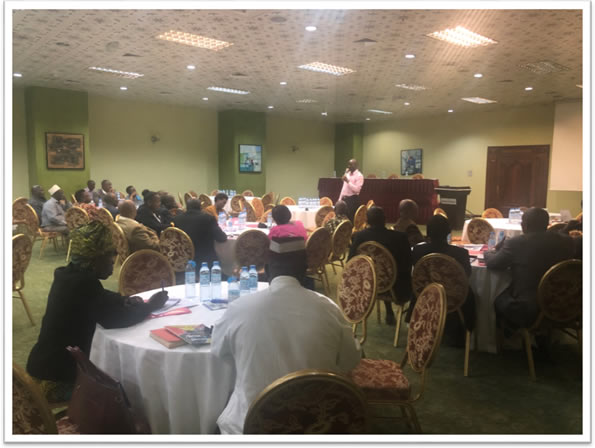
He stressed that pensioners were a totally alienated group in the community. The feeling of loneliness was very real. He noted that while in active employment people were always respected but the moment they left peoples attitude towards them changed. He related to the popular saying that “when you are in the light people follow you but when in the dark even your shadow abandons you”. He indicated that from experience, successful children leave home and those who stayed home were the bad ones who abandoned school and were a nuisance to the community. He encouraged pensioners to keep happy, wealthy and healthy to enjoy retirement life.
He informed members that he retired three years ago at the age of 55. He worked for twenty (20) years in the beverage industry as a Procurement Officer. Prior to his retirement he built a three roomed guest house. It is now the Nile Hotel Jinja with 70 rooms. Last year the investment realized a turnover of Uganda Shillings two billion. He attested that there was a lot of enjoyment in retirement as long as one strategized his goals. He encouraged members to start investments with the little they had and ensure growth of that investment. He recommended rearing local chicken and putting up food stalls as some of the affordable business ventures. Such small scale businesses would keep pensioners alive, energized and busy.
Case Example Shared (Poor child upbringing)
It was emphasized that parents needed to bring up well and instil good morals in their children. A real case example of the effects of poor child up bringing was attested by one of the pensioners. He informed members that he had a close neighbour who was retired and owned plenty of land. On a sad note the old man was very sick and frail. The old man had some time back distributed a share of the land to all his sons. Despite this, the sons were taking advantage of the father’s illness and selling off the remaining portion of land through forging his signatures. This was an eye opener that as people age, they should endeavour to institute safeguards against such predators. Such unfortunate incidences depicted some of the challenges faced by the elderly due to poor morals.
2.3.3 Living Healthy, Nutrition and Wellness
The presentation was delivered by Dr.Paul Kasenene. He stressed that everyone wants to be healthy and well. However the biggest question today was “are people really well”? He raised concern that most people today were faced with health challenges such as stomach upset, cancer, diabetes, heart disease, allergies, anxiety among others.
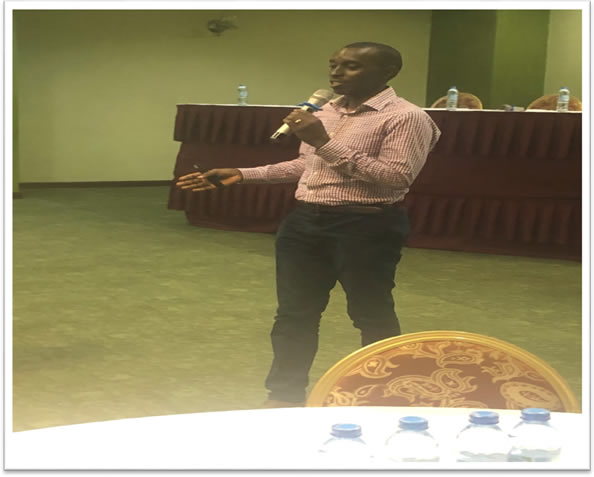
The root causes of such challenges included poor diet, stress, toxins, lack of sleep, poor relationships, nutrient deficiencies, lack of exercise, toxic thoughts, trauma, genetics and poor digestion among others.
He underscored the need for people to embrace the steps of healthy living by undergoing regular comprehensive health assessment /screening. Key in mitigating health challenges was to guard against high levels of cholesterol and making good health choices such as the adoption of the seven fundamental principles of healthy living:
i) Drinking plenty of water
ii) Eating a healthy diet
iii) Supplementing diet
iv) Detoxification
v) Exercise and physical activity
vi) Stress management and peace of mind
He further elaborated on the effective ways of adopting the above principles through considering the following actions;
i) Drinking plenty of water:
• At least two (2) litres /day, the amount required = weight in kg/30, room temperature or warm not hot or cold.
• Don’t drink while eating (drink ½ an hour before and 2 hours after meals).
• Start the day with two glasses (500ml) of lemon and cucumber alkaline water.
• Avoid water deficiency in the body. This causes problems such as headache, backache, digestive problems, joint pains, fatigue, high cholesterol, high blood pressure, memory loss and weight problems.
ii) Eating a healthy diet:
He reminded members of the biblical quote of “then God said, I give you every seed bearing plant on the face of the whole earth and every tree that has fruit with seed in it. They will be yours for food” Genesis 1:9 should be a benchmark for peoples eating habits to ensure good health.
• 90% of diet must be based on plant foods and only 10% from animal products.
• Eat micronutrients contained in non-starchy vegetables and fruits to a minimum of 50%, Healthy protein 25% and energy 25%.Non starchy vegetables with high nutrients and relatively low calories include dark green leafy vegetables such as Spinach, Nakati, Dodo, Sukumawiki, Lettuce, Cabbage, and Cucumber. Also important are cruciferous vegetables which fight cancer such as broccoli, cauliflower, cabbage, brussel, sprouts, carrots, beetroot, tomatoes and onions.
• Eat (15-20%) of a coloured fruit diet at least 4 servings per day in small quantities. These offer strongest protection against certain cancers.
• Eat (25%) plant based proteins diet such as legumes (beans, kidney beans, soya beans and peas). Green vegetables such as (spinach, barley, broccoli) and nuts (ground nuts, almonds, cashews and peanuts).
• Eat animal protein and products: Not more than 10% of diet should come from animal products. Don’t consume these more than once a day, preferably only two meals a week. Major sources are lean meat (poultry and fish), and eggs in moderation.
• Red meat such as (beef, goat, lamb and pork) should be avoided because they are high in saturated fat and acid.
• Reduce or if possible stop consumption of processed and cured meats such as sausages, salami, ham, bacon and frankfurters. These have acrylamides and nitrites which may increase chances for cancer disease.
• Consume high fibre starchy carbohydrates and whole grains (20% of diet) such as oranges, sweat potatoes, pumpkins, yams, cassava, Irish potatoes and matoke. Whole and intact grains such as unrefined maize, millet, oats, whole grain bread, brown and wild rice and other grain cereals.
• Avoid carbohydrates such as refined white flour products (white foods), white bread, chapatti, samosa, mandazi, white rice, white pasta, refined white posho, refined pastries like cakes, biscuits and crisps.
• Avoid fried foods such as chips.
• Avoid artificial sweetened products such as packed fruit juices, soda and sugar. These lead to weight gain, heart disease, diabetes and earlier death.
• Dairy products like milk are healthy but only for children. Milk is very nutritious and so may not be very healthy for adults. Consumption of milk should be reduced or avoided because it contains high levels of saturated fats and calories which may lead to weight gain, heart disease, diabetes and cancer. Milk is also high in protein, the acidic type may damage the kidneys and cause osteoporosis. The allergenic type may worsen or precipitate allergies, cause immune problems and memory loss.
• Avoid dairy products of full cream and whole milk, use skimmed milk in moderation and low fat yoghurt. Avoid cow’s milk and look for alternative sources such as soy and almond milk.
• Avoid vegetable fat and cooking oils.
iii) Supplement diet with omega oils, multivitamins, krill, organic matcha, and chai seeds. Other supplements include magnesium (high blood pressure, diabetes and stress), vitamin D, (for strong bones, heart and immunity) Ashwagandha for stress relief, quercetin (for allergies and asthma), Glucosamine (for joints), Liver detoxifier (especially for people who drink alcohol).
iv) Use detox and weight loss products to eliminate toxins that affect the body. Fruits and vegetables that could help detoxify include (Aloe Vera, Beetroot, Lemon, Apples, Broccoli, cabbage, lettuce, garlic and spinach). Green tea could also be used.
A Juice fast could also be considered for detoxification. This involves Juicing for 3-7 days, while consuming only raw vegetable juice, fruit juice and water for a short period of time. A nutri bullet helps to transform fruits and vegetables into nutritious exceptional liquid fuel for the body.
The benefits of the juice fast include;
Loss of weight. One could lose 2-4 Kgs in 3-7 days
Cleanses the body
Helps with constipation
Improves energy levels
Boosts immunity
Helps control blood pressure and sugar
v) Ensure daily exercise/physical activity at least 20-30 minutes of moderate intensity. This could be perfected by acquiring a fitness monitor.
vi) Manage stress and peace of mind.
Members were advised to;
• Find out how healthy they were by undergoing different tests such as BMI, BP, Blood sugar, Cholesterol and Vit D.
• Drink plenty of water.
• Eat healthy.
• Lose weight and regularly detoxify.
• Make exercise a must, start simple, get a fitness monitor to track exercise. World Health Organisation recommends 10,000 steps per person daily.
• Acquire a nutri bullet to easily blend fruits and vegetables into juice.
• Get started it’s never too late to change.
• Eat real natural food which is unrefined or unprocessed.
• Eat healthy meat such as local chicken and fish.
• Avoid oily foods.
• Eat 2-3 table spoons of chia seeds a day. These are very healthy for the body.
• Keep motivated.
• Before going to bed or waking up in the morning say the word (Thank you x 10).
• Take 15 deep breaths first thing in the morning and before sleep. This helps to calm the mind.
• Always forgive. Emotions have such a powerful impact on the body. If one wants to be well he/she must forgive.
Members were requested to meditate on the following phrases;
• “Those who think they have no time for exercise will sooner or later have to find time for illness”.
• “ what fits your busy schedule better, exercising one hour a day of being dead 24 hours a day”
• “No matter how far you have gone on a wrong road, turn around”
• “Sometimes the smallest step in the right direction ends up being the biggest step of your life. Tip toe if you must, but take the step”.
• “Your health is an investment not an expense. Although it will become an expense if you don’t take time to invest in it”.
• “Although they can show you the way, only you can take the steps to your new possibilities”.
• Take care of your body it’s the only place you have to live”.
2.3.4 My Parliamentary Pension Scheme Frequently Asked Questions
Mr. Edward Basheka, the Benefits Administration Manager presented the most frequently asked questions and their answers as follows;
|
SN |
Frequently Asked question |
Answer |
|
1. |
Who stole my pension? |
Pension was safe. No body stole it. |
|
2. |
Where is it? |
A pension is a promise that one will be paid a certain amount of money at the specified time. |
|
3. |
Can I take it all now? |
No, this was not possible. This can only happen under certain circumstances. Pension was for life. |
|
4. |
Can I have my pension statement? |
A member statement was only given to active members. Pensioners are given payslips as proof of fulfilling a promise. |
|
5. |
When does my pension increase? |
Pension increases on one’s anniversary and depends on the date of exit. By law, it increases by 4% to take care of inflation. After every three years, an actuarial valuation is carried out which looks at the inflationary trends to guide any revisions. |
|
6. |
When is my monthly pension paid? |
The payroll is run every 1st day of the month. The payment was taken to the bank by the 10th of each month. Credit on individual accounts depended on their banks. All pensioners should receive their pension by the 15th day of the month. |
|
7. |
What happens to my pension when I pass on? |
Pension was guaranteed for 15 years. If one died before the 15 years, It’s passed on to the beneficiaries for the remaining period. However if one continued to be alive past 15 years, he/she would still receive pension. |
|
8. |
What happens when I get re-elected? |
When one gets re- elected payment of pension is halted. The member starts contributing actively from salary. The actuary is requested to work out the present value of pension which is introduced into one’s member statement as a contribution and starts generating interest as an active member. At retirement this would be converted to improve the pension. |
|
9. |
Why don’t I get an SMS when my pension gets paid |
Sms’s were a type of un guaranteed communication. Receipt of Sms’s is affected by change of telephone numbers without updating with the Scheme. Others opt out of SMS’s making it impossible to receive messages. However the Scheme had tried to improve communication by making individual calls to members. |
2.3.5 Panel Discussions and emergent issues during the presentations
a) Knowing the truth. When could one tell that he/she knows the truth?: It was explained that this was when one starts feeling happy, doing things that make him/her relaxed and getting stressors out of his/her life.
b) Defensive investments. Members sought the meaning of defensive investment:
It was explained that this was being conversant with the investment risks and learning the good and bad of every investment decision a person makes.
c) Detoxification programmes show cast on television stations. Guidance was required on whether detoxification programmes showed on television stations through putting feet in a basin of water were genuine: It was explained that detoxification was only done in the liver, lungs and kidneys and could not happen by putting feet in water. Members were cautioned of such products which the media always portrayed as attractive. Such products were not oftenly effective.
c) Controversy on consumption of meat and milk. The presentation on health and well-being sounded controversial by discouraging consumption of milk and meat: It was attested that in karamoja milk and meat were daily bread. Experience was on record that people from the region had a long life span. Today a number of articles say milk was a complete food contrary what had been presented. Members were confused on the way forward.
It was explained that every animal had its own meat and milk. Best milk for human beings was breast milk. Research had indicated that the hunter gatherers population fed predominantly on meat, blood and milk. The life expectancy of these was not as great as those who fed on plants. The Human digestive system does not do well with meat as it does with vegetables. Today, the people of Karamoja had also adapted to a diet of plants for health living.
e) Consumption of sugar vis-à-vis Honey. Clarification was required on the health implications of consuming sugar or honey: It was explained that Sugar is a processed substance which is not good for the body. Honey is healthy and has been used for many years as medicine. Raw honey however contains more calories than sugar, this should therefore be avoided. Honey and sugar could be substituted by a pant called stevia, which contains natural sugar and healthy for consumption.
f) Increasing rate of alcohol consumption. The rate of alcohol consumption today was on the rise. Butabika was admitting increased cases of substance abuse members required guidance on healthy alcohol consumption: It was explained that just like coffee, alcohol is a stimulus which has high potential to cause dependence and addiction. The safe limits prescribed by the World Health Organisation (WHO) were 6 drinks per week but not more than two bottles of 350 mls of beer per day, wine 150 mls, and spirits 50 mls. Red wine was recommended because it has a component of grapes which was very good for the heart.
g) Omega substitutes. Advice was required on the health benefits of omega 3 from plants vs. those of fish: It was explained that plant based omega 3’s were better than those of fish. These are natural and can be got from chia seeds and avocados. Omega 3 are anti- inflammatory, omega 6 are inflammatory and may cause clotting. Eating a lot of fish like tilapia was a good supplement of omega oils.
h) Importance of a Nutri Bullet. Guidance was required on how the nutri bullet works. Members were sensitized that this was an instrument used to make juice out of fruits and vegetables. It has a high propensity to squash fruits and vegetables into juice healthy for the body. The recommended ratio of fruits to vegetables was 1-3, (75% vegetables and 25% fruits) when making juice.
• Ingredients for vegetables include: (Carrots, cabbages, lettuce, broccoli, sukumawiki, spinach, cucumber, garlic, aloe vera and others).
• Ingredients for fruits include: (Beetroot, pineapple, lemon, oranges, apples, grapes, and others).
i) Limited resources in retirement. Advice was sought on where people who retire with nothing or limited resources could start from. It was explained that it was important for such people to adjust their lifestyle and live real lives, minimize consumption spending by managing expenses, avoid going for big things, do not copy what others were doing and engage in businesses which do not require a lot of start-up capital such as rearing local chicken, putting up a kiosk and selling tomatoes. Diversification of income generating ventures however small they were was encouraged.
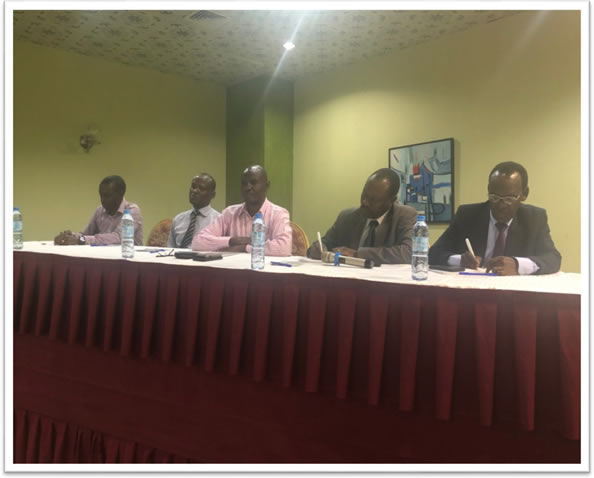
Members were further advised to make use of available assets to generate income such as turning houses into homesteads / a guest house where people can spend nights at a cost and hiring out a big car. Things that were costly to maintain could also be sold and the proceeds used to reinvest. Members were urged to be focused, persevere and not shy away from doing something as long as it makes money.
j) Status of pension enhancement for members. Update on the promise of pension enhancement was sought: It was explained that Members of the 2001 -2006 Parliament were provided pension but due to the miserable earnings then the savings towards pension was very small. In July 2014 salaries of active members were enhanced leading to substantial retirement savings. In order to create a balance between active members and pensioners who left in 2006. The Board engaged services of the actuary to compute various scenarios to guide its request to the Parliamentary Commission for support.
There was also another category of members who served before the PPS Act was enacted in 2001. His Excellency the President promised to give extra gratia in appreciation of their diligent service to the country. The Board was still following up the matter with the office of the Speaker.
k) Disparities in accessing Scheme benefits. Concern was raised in the assumed inequities that in agitating for beneficial issues to members, (former staff of the Parliamentary Commission) were always left out: It was explained that the proposal on pension enhancement took care of all members including staff.
Members were implored to take keen interest in updating their records with the Scheme and sensitize their beneficiaries on Scheme operations. This would rule out the aspect of higher expectation by beneficiaries and smooth processing of benefits upon demise of a member.
l) Death of a pensioner after 20 years. Members requested to be sensitized on what could happen if a pensioner died after 20 years. It was clarified that there would be no pension for the beneficiaries since one had exhausted the guaranteed pension period.
m) Motion to approve medical insurance for Pensioners. Lack of medical insurance for pensioners was a challenge given the prevailing health vulnerability during this phase of life. Consensus from pensioners was required on addressing the issue. In this regard a motion was moved for Pensioners to vote in favour of a proposal to deduct a portion of their pension income to contribute towards their medical insurance package.
Members observed that;
a) Support was required from Pensioners to allow deductions from their pension income to contribute towards the above cause. This would also aid the relevant computations. Possibilities of collective bargaining to join the facility for active members contributing through the Parliamentary Commission would then be explored. Such a strategy would be cost effective in terms of insurance premiums and management.
b) The above mentioned idea was appreciated, however given the small amount of pension received by most members, such deductions would greatly effect pensioners.
c) Members appealed to the Board to continuously engage the sponsor on pension enhancement. Once this was done pensioners would consider the motion seconded to have a portion of their pension deducted towards medical insurance.
d) Expert assessment of the cost implications and level of limits was also proposed.
e) It was important to note that payment of health insurance for pensioners could not be facilitated by the public or the Parliamentary Pension Scheme. This would be unfair and not in line with the relevant legislation.
It was resolved that pension for members first be enhanced before the motion of contribution towards medical insurance can be considered.
2.3.6 Post Training Feedback from the participants
Feedback from the participants was obtained from the evaluation of the training as follows;
o The session enhanced members with knowledge on how to handle some medical problems without resorting to drugs.
o Sensitization on dangers of drunkardness or over consumption of alcohol should be provided.
o More time should be allocated for such sessions. At least two days.
o Active participation, interaction and sharing individual experiences should be encouraged.
o More knowledge on financial discipline was required.
o Provide more information on the Parliamentary Pension Scheme and its procedures.
o Pensioners should also be invited to attend sessions organised for active members.
o Participants should have time to exercise.
o Sessions on interpersonal relationships should be provided.
o More business ideas to be considered in retirement were required.
o Additional skills should be shared on beginning enterprises.
o The topics were pertinent and the presenters were very knowledgeable and interesting.
o More time allocated to the trainers.
o Such opportunities enable pensioners feel refreshed.
o More information was required on the fitness monitor.
o The training was well balanced.
o Provide more sessions on nutrition and wellness.
o Such sessions should be offered to pensioners every six months.
o More pensioners should be encouraged to attend subsequent sessions.
o Equip pensioners with the knowledge to select profitable enterprises that favour little money.
4.0 Closing Remarks
The Chief Operations Manager expressed delight that members found time to attend the session. She thanked participants for all the contributions made and wished them good health, good learning and safe journeys back home. She informed members that during the financial year 2019/20 the Scheme would start on a pensioners verification programme to find out how all were doing. This would enable appropriate profiling in building data for the sector.
The session was closed at 2.30 pm.
5.0 Conclusion
The seminar was a success and members appreciated the information shared. They looked forward for more sessions to be organised in the near future. They were grateful to the Board and Management for such a gesture.
